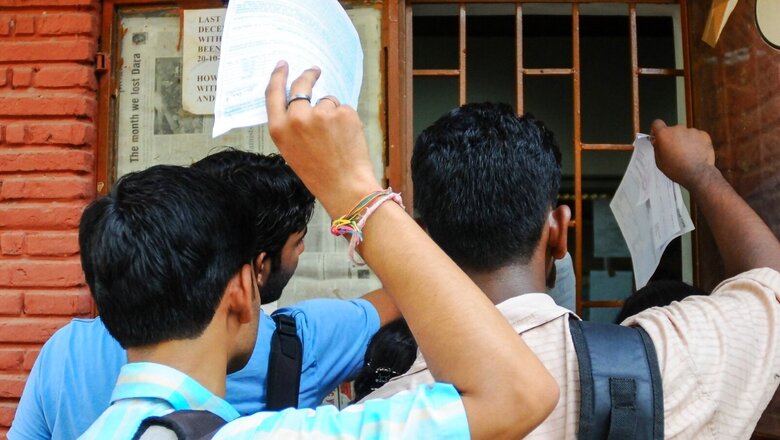
views
The National Testing Agency (NTA) will soon announce the Joint Entrance Examination (JEE) Main 2023. As per the reports, NTA will start the registration process for the engineering entrance exam in the third week of November 2022 and the online computer-based test (CBT) will be held in January and April in 2023.
In order to appear in the entrance test, let us know who can apply for the engineering entrance and what is the eligibility criteria candidates have to meet.
JEE Main 2023: Education Qualification
Candidates who have passed 10+2 (Class 12) board examination or pursuing this year with physics and mathematics as mandatory subjects along with chemistry and biology are eligible to appear for the JEE Main exam 2023.
Also read| JEE Advanced 2022: Students from Rajasthan Bag Most Seats Across IITs
JEE Main 2023: Age Limit
For appearing in the JEE Main, there is no age limit for the candidates. The candidates who have passed the class 12/equivalent examination in 2021, 2022, or appearing in 2023 irrespective of their age can appear in JEE Main 2022 examination. However, the candidates may be required to fulfill the age criteria of the institute(s) in which they are desirous of taking admission.
JEE Main 2023: List of Qualifying Exams Beyond 12th
Apart from class 12, any intermediate or two-year Pre-University examination conducted by a recognized Board/ University can apply for JEE Main. Students in final examination of the two-year course of the Joint Services Wing of the National Defence Academy as well as those appearing for Senior Secondary School Examination conducted by the NIOS with a minimum of five subjects can apply.
Any Public School/ Board/ University examination in India or any foreign country is recognized as equivalent to the 10+2 system by the Association of Indian Universities (AIU), higher secondary certificate vocational examination, a diploma recognized by AICTE or a State board of technical education of at least three years duration can apply.
General Certificate Education (GCE) examination (London/Cambridge/Sri Lanka) at the Advanced (A) level, high school certificate examination of the Cambridge University or International Baccalaureate Diploma of the International Baccalaureate Office, Geneva is also an eligible qualification.
In case the Class 12 Examination is not a public examination, the candidate must have passed at least one public (Board or Pre-University) examination earlier.
Reservation criteria in JEE Main for undergraduate Engineering courses:
– General-EWS category: 10% seats reserved
– OBC-NCL: 27% seats
– Scheduled Caste (SC): 15%
– Scheduled Tribe (ST): 7.5%
– Persons with Disability (PwD): 5%
Read | JEE Main 2023 Application Form to be Out in November, Exam Likely in January & April
JEE Main 2023 session 1 will be held in January and session 2 in April. The best marks obtained by candidates in any of the two sessions will be considered to calculate ranks, as per the rules. Students can choose to take one session of both. The application forms for the second session will be out by March.
After having four attempts at JEE Main in 2021 and delayed exam dates in 2022, the pre-pandemic academic calendar is expected to resume this year. This will not only be applicable for JEE Main but also for NEET and CUET.
Read | Big Pay, Fame: How Students Rushing for IT Jobs is Taking Shine Off Core Engineering Roles
JEE Main exam pattern so far remains the same. JEE Main will be divided into two sessions. Section A will be of multiple-choice questions (MCQs), while section B will have questions whose answers are to be filled in as a numerical value. Section A is compulsory and for every correct answer, four marks will be granted, however, for every incorrect answer, one mark will be deducted. In section B, candidates have to attempt any five questions out of the 10 given. There will be no negative marking for section B.
Read all the Latest Education News here




















Comments
0 comment